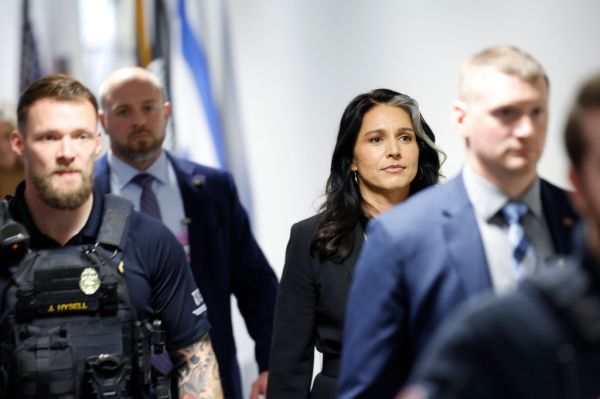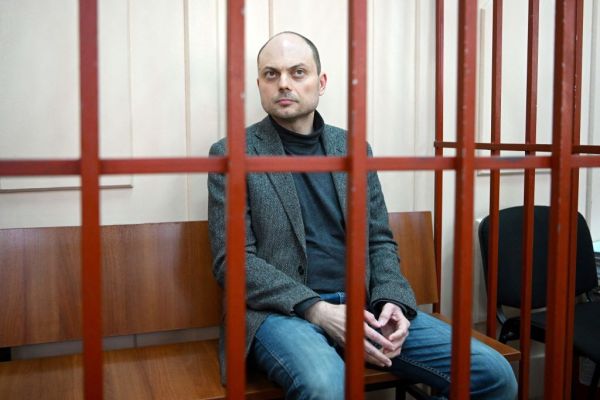Vladimir Putin’s reputation as a real-life Bond villain ain’t what it used to be.
The will is there. In terms of ruthlessness, Ernst Stavro Blofeld has nothing on a man given to bombing Ukrainian schools for sport. But what about talent? Putin’s fantasy of a new Russian empire has left his country marginalized economically, in steady retreat on the battlefield, and short 100,000 or so troops. He isn’t a master geopolitical chess player, it turns out.
Come to think of it, neither was Blofeld. Like Putin, his well-laid plans were foiled in the end too.
Bond villains are overrated.
Putin is still capable of pulling a fiendishly clever caper, though. I don’t know how else to describe the prisoner swap with Russia announced by the White House this morning.
Brittney Griner, as you may know, is the WNBA star detained by Russian authorities on drug charges in February, coincidentally just a few days before the invasion of Ukraine. Her crime was carrying vape cartridges containing hashish oil; she later pleaded guilty, insisting that she had brought the substance into Russia “inadvertently.”
She was sentenced to a preposterous nine years in prison anyway and dispatched to a Russian penal colony, although no one expected her to serve much time. Griner’s fame ensured that her case wouldn’t be forgotten. The White House would have to make a deal with Moscow to gain her release.
And Putin knew it, and he tailored his demands accordingly.
His asking price for Griner was the return of Viktor Bout, a.k.a. “The Merchant of Death,” a man more diabolical than even the most sinister Bond villains. For years Bout sold arms to the baddest of bad guys, making him a sort of Zelig figure in the dirtiest conflicts on Earth. “He is responsible for enabling murderous groups to kidnap and train thousands of child soldiers; use rape as a systematic method of terror and control; torture through the mass amputations of arms, legs, ears and lips; slaughter civilians, and help the Taliban take power in Afghanistan,” wrote Douglas Farah, Bout’s biographer, a few months ago. In the late 1990s, the only man more wanted by U.S. intelligence was Osama bin Laden.
He’s comically, soullessly evil.
U.S. spooks finally caught up to him in Thailand in 2008 and hauled him in. He was convicted in 2011 of supplying FARC guerrillas in Colombia with weapons for the purpose of killing Americans. He’s been rotting in a federal penitentiary in Illinois ever since, a fate that’s kept one of the world’s most dangerous men off the international chessboard … until this morning, when he was put on a plane home to Russia in exchange for Griner’s release.
We can debate whether that was a good deal for the White House. It was certainly a good deal for Putin.
It’s always a good deal, one might say, to have captive Americans home, free, and out of harm’s way. Certainly it’s good retail politics. There are few photo ops sweeter for a president than having the spouse of a freed hostage gush with gratitude on camera over how the administration moved mountains to bring their beloved home.
Griner’s fame further sweetens the deal. American athletes are celebrating the news of her release on social media today. Griner herself is destined to do emotional television interviews once she’s home about the hardships she faced as a prisoner in Russia and how thankful she is to be free.
If you’re worried about the new Congress cutting off aid to Ukraine, having her on TV relaying firsthand how comically, soullessly evil Russian officials are is all upside. I wonder if Team Biden considered that in pushing to get her out before the new Republican House is seated in January.
On the other hand, if you’re worried that the war in Ukraine will spiral and cause relations between the U.S. and Russia to disintegrate, there’s no time like the present to make a deal on prisoners. That deal may not be available tomorrow. Griner’s freedom may have been a matter of now or never.
It’s nice to know that she’s coming home. But it’s not universally true that freeing an American hostage is cause for rejoicing. And a man who served as Barack Obama’s No. 2 would know that better than most.
I remember vividly the fanfare with which the Obama White House touted the release of Bowe Bergdahl from Taliban captivity in 2014. That was understandable in the abstract, as normally the country is overjoyed to see an American POW liberated. But the national mood soured as more facts about that deal came out. In exchange for Bergdahl, Obama agreed to swap five high-ranking Taliban prisoners at Gitmo; within a few years they were back working for the group in Qatar and as of last year four had taken positions in the new Taliban government of Afghanistan.
And Bergdahl, it turned out, was no hero taken prisoner on the battlefield. He had walked away from his post in 2009 before being captured. In 2017, a few years after returning to the U.S., he pleaded guilty to desertion in a military court and was dishonorably discharged.
The bad guys got the better of that trade.
Returning a man known as “the Merchant of Death” to the arena of international warfare in exchange for a basketball player feels similarly lopsided. And of course Jim Geraghty is right that agreeing to swap prisoners with evil regimes like Russia encourages those regimes to take other foreigners prisoner. “By giving Vladimir Putin what he wants, we make other Americans in Russia more likely to be detained and used as bargaining chips in the future,” he writes. “And every other two-bit dictator and warlord around the world is watching and learning, too.”
If you negotiate with terrorists, you incentivize terrorism. All presidents confront that dilemma at some point. One might reasonably conclude that the perverse incentives created by swapping Bout for Griner make this deal a loser, although I tend to agree with Josh Barro that Russia’s willingness to kidnap visiting Westerners is much more of a problem for Russia than it is for us.
There’s an X factor that makes today’s prisoner exchange even more agonizing for Biden and correspondingly more clever for Putin, however. That X factor is Paul Whelan.
Whelan is a former Marine who was arrested in Russia in 2018, charged with espionage, and sentenced to 16 years in prison. The Trump administration appealed to Trump’s friend Vladimir for his return but couldn’t secure his release. The Biden administration has spent nearly two years working on it but hasn’t been able to swing a deal either. In July CNN reported that the White House had proposed exchanging Bout for Griner and Whelan. But this morning a U.S. official told reporters that Moscow wouldn’t hear of it, making clear that this was “not a choice of which American to bring home. It was a choice of bringing home one American, Britney, or bringing home none.”
Upon hearing that Griner would be coming home but their relative wouldn’t, Whelan’s family was remarkably gracious.
His brother went on television to reiterate that Paul’s continued captivity is less a matter of Team Biden neglecting him than Team Putin rejecting offers for his return. But Paul Whelan himself wasn’t as gracious during a phone interview today from a Russian penal colony with CNN.
“I am greatly disappointed that more has not been done to secure my release, especially as the four year anniversary of my arrest is coming up. I was arrested for a crime that never occurred,” he said in an exclusive phone call from the penal colony where is being held in a remote part of Russia. “I don’t understand why I’m still sitting here.”
…
“I would say that if a message could go to President Biden, that this is a precarious situation that needs to be resolved quickly,” he said.
“My bags are packed. I’m ready to go home. I just need an airplane to come and get me,” he said.
It was considerate of his captors to grant him phone privileges to complain about Biden to a prominent American news outlet on the day of the big swap, I’m sure you’ll agree. Judge for yourself how free Whelan must have felt to speak his mind with Russian goons standing next to him, observing.
At first blush it’s strange that Putin would offer Griner alone in a prisoner swap. If his goal were to drive a hard bargain and extract further concessions from the White House, it appears that goal was accomplished once Team Biden agreed to swap Bout for Griner straight up. Surely there must be some Russian somewhere in Western captivity whose return Moscow seeks and to which Biden would be amenable, if only to spare himself the headache of having to explain to Americans why Whelan was left behind today.
The name of Vadim Krasikov was tossed around earlier this year but whether that was a sincere ask or a case of the Kremlin setting a price it knew was too steep is unclear. Krasikov, a former FSB colonel, tailed a Georgian dissident in Berlin and assassinated him in broad daylight in 2019. He’s currently doing time for murder in a German prison, which means the German government would have had to sign off on any deal for Whelan.
Krasikov certainly meets the Russian prison-swap criterion of being comically, soullessly evil. But the obvious bureaucratic hurdles involved in freeing him may have made Russia’s request for his release less than fully serious.
It sounds like Whelan was entirely off the table for now, in order words. Which brings us to the fiendishly clever part of this devil’s bargain.
It’s possible that the Russians view Whelan as qualitatively different from Griner. She committed a minor drug offense; he was convicted of spying. The asking price for the latter is destined to be higher than for the former, as Whelan himself acknowledged.
But I wonder if Moscow didn’t insist on excluding Whelan from a deal involving Griner simply to inflame cultural tensions in the U.S.
By offering the White House the return of a gay black female celebrity while ruling out the return of a white male Marine, Putin put Biden in a no-win situation. If the president rejected a deal for Griner on grounds that he wanted both Americans back or none at all, that fact eventually would have leaked. And Biden would have been stuck explaining why he wouldn’t accept half a loaf, bringing Griner home while continuing to work on getting Whelan out.
Members of his own base might have accused him of bigotry. “Why is the freedom of a queer African American woman being made contingent upon the freedom of a white man?” some would have asked. “Isn’t her life valuable enough in its own right?” It would be touted as a supreme example of white privilege, alive and well in 2022 even with a Democrat in the White House. All Americans are equal, supposedly, but progressives would have concluded that some are more equal than others.
If you doubt that identity politics was on the minds of certain leftists this morning, here’s teachers union chief turned school lockdown enthusiast Randi Weingarten making it explicit.
Whelan was literally an afterthought in her haste to celebrate the return of an American who belongs to the right “vulnerable communities.” Imagine Weingarten’s reaction if Biden had told the Russians that we don’t want Griner unless the less vulnerable white guy is part of the deal too.
On the other hand, if the president did what he eventually ended up doing, bringing Griner home while leaving Whelan behind temporarily, he’d end up taking cultural flak from the right. Offering Griner while holding back Whelan was probably the Russians’ way of teeing up American conservatives to complain that our woke Democratic administration values the life of a famous gay black woman more than it does the life of a white man who served this country in the Marines.
And not just any famous gay black woman. A famous gay black woman who was caught with drugs, and who once called for the WNBA to suspend the playing of the national anthem for a season to protest the killing of Breonna Taylor. A sampling:
The culture-warrior-in-chief is also indignant.

The fact that Biden swung a deal with Russia to release imprisoned Marine Trevor Reed as recently as this past spring will earn him no benefit of the doubt among entrenched critics as to how highly he values the freedom of veterans, needless to say. Tonight’s opening monologue on Tucker Carlson’s show is destined to be a Very Special one indeed.
One might scoff at all of that and counter that Putin and his cronies don’t understand America well enough to exploit its divisions. Don’t they, though? Putin nurtures his image as a warrior for Christian cultural hegemony partly because he knows certain mainstream conservatives in the West are suckers for it, just as they’re suckers for the ridiculous macho hype surrounding Russia’s collapsing military. He and his advisers would hardly need a firm grasp of our culture, particularly in the Trump era, to glean that our politics now is largely a running argument over which side gets to define American identity as demographics change. Griner vs. Whelan is part of that argument, a tangent in the debate over which Americans are more equal than others.
Frankly, I’m surprised Vlad didn’t make things really hard on Biden by publicly offering him Griner or Whelan but not both, forcing him to choose. You can imagine him lifting a pinky to his lips a la Dr. Evil in floating that proposal, knowing the sort of uproar it would cause here no matter which captive Biden chose.
Few people know Viktor Bout’s grisly record better than his biographer, Douglas Farah. For what it’s worth, Farah argued this summer that a Bout-for-Griner swap was worth doing because Bout is no longer the threat he once was.
Bout is a spent force who will be out of jail in a few years anyway. His business depended on personal relationships and trust among the parties. After being out of the business for more than a decade, Bout has neither of those left in the shadowy world in which he once operated. Second, Bout needed access to a global network stretching from Afghanistan to Europe, Africa and South America. That network has morphed through several generations of new actors, markets and gatekeepers. Bout has no currency in that world now.
Finally, Bout depended in the early years on the gross negligence of the former Soviet states to allow him to simply fly out aircraft and weapons in a spree of de facto privatization of one of the world’s most advanced arsenals. In his later years, he was reined in by the Russian state under Putin, no longer able to freelance at will and without unfettered access to massive caches of weapons. It is unlikely he would have any freedom of movement in the weapons trade unless he was in the direct service of the Russian intelligence services, and now he is burned beyond the ability to be useful in any significant capacity.
I doubt Putin wants Bout back because he has grand plans for him in trafficking weapons. Uh, what weapons?
He wanted him back, in all likelihood, simply to make Biden’s concession in seeking Griner’s return that much more garish. “The Merchant of Death” in exchange for a gay minority? Outrageous, especially to a Russian audience. Tom Nichols explained the Kremlin’s thinking in holding Griner hostage back in August. “Russia does not value all its citizens equally; some Russians matter and others vanish without trace,” he wrote. “The efforts to spring Griner, however, almost certainly feed into a Russian narrative that America, too, does not care about all of its citizens equally and that we value racial or sexual minorities disproportionately—exactly the case that anti-Western hysterics like Putin have been making for years. Look at the effort the Americans put into getting this person back, the Russians will say later. That’s who they care about.”
The idea that the decadent West values racial and sexual minorities disproportionately is precisely the point Putin hopes his sympathizers over here draw from today’s exchange. He already has some takers.
Oh well. The White House will have to figure out a way to repay him for rolling this grenade into our cultural tent. There’s no shortage of options, fortunately.









Please note that we at The Dispatch hold ourselves, our work, and our commenters to a higher standard than other places on the internet. We welcome comments that foster genuine debate or discussion—including comments critical of us or our work—but responses that include ad hominem attacks on fellow Dispatch members or are intended to stoke fear and anger may be moderated.
You are currently using a limited time guest pass and do not have access to commenting. Consider subscribing to join the conversation.
With your membership, you only have the ability to comment on The Morning Dispatch articles. Consider upgrading to join the conversation everywhere.